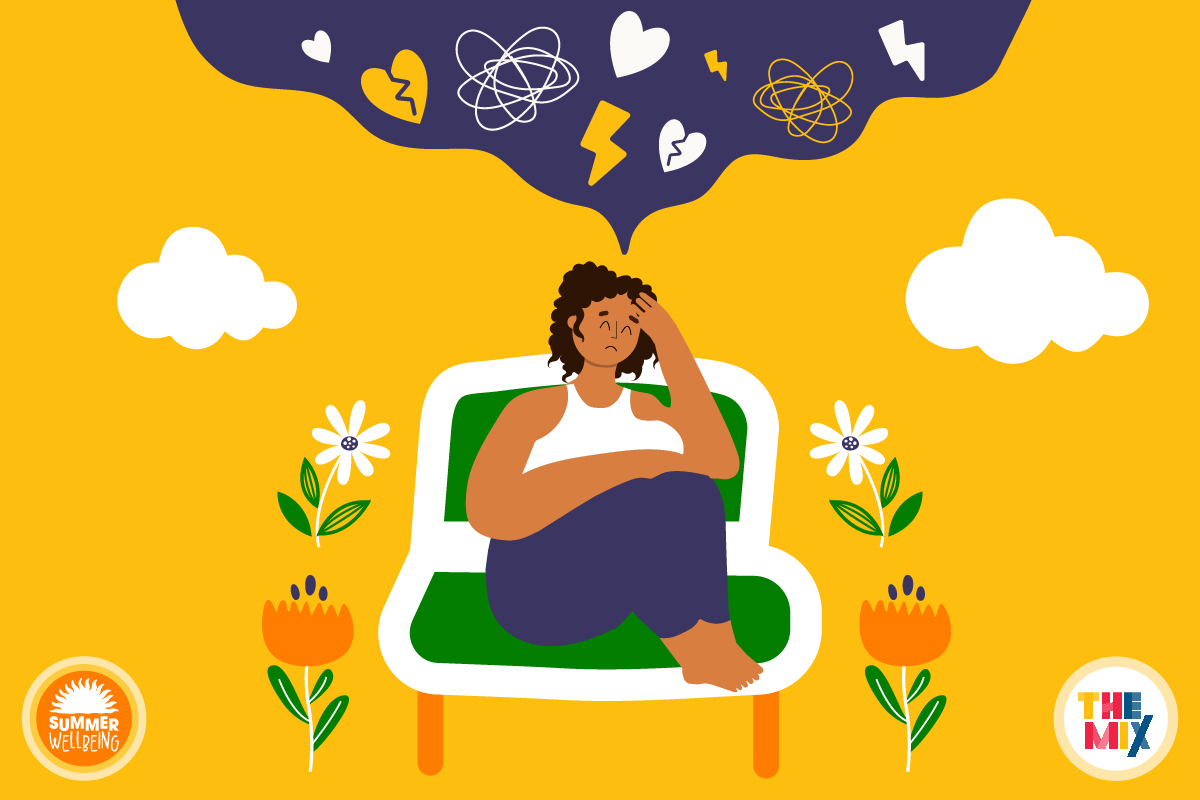How to spot when someone needs mental health support

T/W This article includes references to suicide, self-harm and disordered eating
How can I spot when someone needs mental health support?
Things like anxiety, depression and stress affect nearly all of us at some point in our lives and it wouldn’t be surprising if some of your friends or family are dealing with this right now. In some cases it’s clear someone is going through a rough patch. Perhaps you’ve seen them crying or you can just tell from their body language that they’re feeling anxious. In other cases it isn’t so clear and some people are very good at hiding their emotions. No one should have to hide the way they feel, which is why it’s important to look out for signs of when someone is struggling. These signs may look like…
- Becoming more reserved, turning down invitations to hang out, being quiet or seeming distant when you’re talking to them
- Seeming restless or on edge or avoiding social situations
- Becoming particularly defensive, argumentative or difficult to talk to
- Neglecting self-care, such as personal hygiene or healthy sleeping patterns
- Becoming strict around eating, cutting things from their diet and being fidgety around meal times. This could be early signs of an eating disorder
It’s worth saying that some people won’t show any signs of struggling. But if you know they’ve recently gone through something difficult, such as a break up or losing someone close to them, it’s likely they’re having a tough time and it’s worth checking in.
What can I say to them?
If someone you care about is struggling, you’re naturally going to want to help. If you think talking to them could help (it usually does!), try to find a time when it’s just the two of you in a place where you won’t be interrupted. Tell them you’ve noticed they’ve been acting differently and that you want to be there for them. You could also use some of the following lines – choose whatever is appropriate for the situation…
- I’m here and I’m listening
- You’re safe right now in this moment
- What can I do to help right now?
- It sounds like things are really tough right now. I’m sorry you’re going through this
- Thank you for telling me, you’re not going through this alone
Moreover, navigating the vast landscape of mental health resources can be overwhelming, but platforms like https://clarityease.com/ offer a comprehensive array of tools and support to facilitate this journey. From finding the right therapist to accessing therapeutic tips through their blog, individuals can explore a wealth of resources tailored to their specific needs and preferences. By harnessing these resources, individuals can take proactive steps towards prioritizing their mental well-being and fostering a supportive environment for themselves and those around them.
Additionally, when someone is facing a difficult time, offering both physical and mental first aid can be crucial. Just as we learn basic first aid to address physical injuries, being equipped with mental health first aid skills is equally important. Consider suggesting mental health first aid training as a proactive step towards better understanding and supporting each other’s emotional well-being. This training can empower individuals to recognize signs of mental health struggles, provide initial assistance, and guide someone towards professional help if needed.
Recommending local mental health support groups can be helpful too, but remember that if someone is just opening up for the first time it might take a little longer before they’re ready to talk about their situation with other people.
Anything I shouldn’t say or do?
It’s fairly obvious but avoid saying things like ‘look on the bright side’, ‘it’s not that bad’ or ‘you’re overreacting’. This is unlikely to help and could lead to them retreating further into themselves.
Try not to pressure them into opening up or finding help. Instead just let them know you’re there for them and make suggestions when it feels appropriate. For example, you could offer to help them find a therapist or invite them to join a sports group with you – both of these could really help if suggested at the right time in a low-pressure way. Similarly, you could go along with them to a mental health support group to take some of the pressure off.
What if I’m really worried about them?
If you’re really concerned for the safety of a friend or family member, it’s best to get professional help. If you think someone is self-harming or at risk of suicide, try having a kind but frank conversation with them explaining how concerned you are. You can suggest going to their GP for advice and support, you could raise the issue with a parent or teacher or you could talk to The Mix either online or over the phone for advice. If you think your friend is in immediate danger, contact the police (999) or Samaritans.
Your friend may tell you things confidentially, but avoid making promises to keep secrets if it’s about something as serious as self harm or suicide. If you feel it’s necessary to reach out to professionals, let them know before you do it so they don’t feel betrayed. They may get angry and distance themselves from you but please remember, you did the right thing to keep your friend safe.
How to look after yourself in all this
When someone we love is struggling it’s very easy to get caught up in it. It can even start to affect our own mental health. This is where boundaries come in. If it’s all starting to feel too much, don’t feel guilty for taking a break and looking after yourself.
If you need some space or just don’t feel you can take on the responsibility, you can try saying some of the following…
- “I want to listen but at this moment I can’t give you the attention I want to. Can we catch up a little later when we can talk properly?”
- Thanks for sharing this with me. I’m not sure I’m the best person to get help from but how about we speak to a teacher together?”
- “It sounds like things are really tough and I’m happy to listen, but right now I need to look after myself”
Along with boundaries, don’t forget your self care toolkit. Make time for the things that bring you joy in life and reach out for support yourself. After all, you can only be the best support to others if you’re well supported yourself.
Next Steps
- Mind offers advice and support to people with mental health problems. Their helpline runs nine to six from Monday to Friday. 0300 123 3393
- Chat about this subject on our Discussion Boards.
By Olivia Capadose
Updated on 12-Aug-2022
Sorry, comments closed
No featured article











